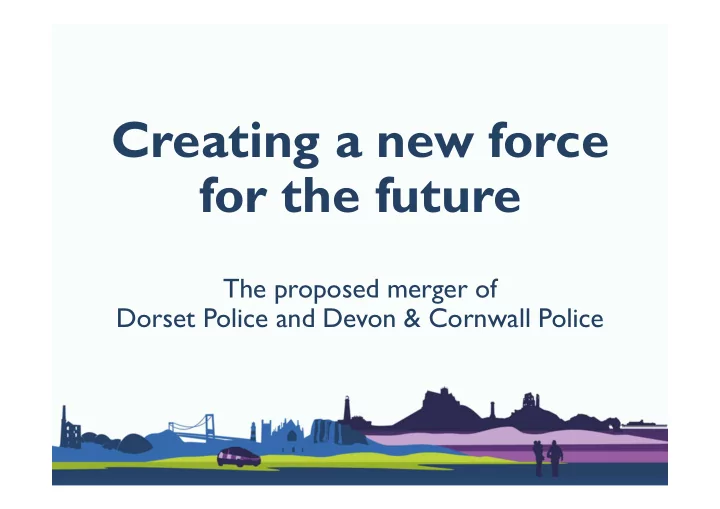

Creating a new force for the future The proposed merger of Dorset Police and Devon & Cornwall Police
Working together 2015 alliance agreed 25% of staff 38 business cases 21 live business areas
Where we are today Operational Operational Other teams due Business Support Policing Support to go live this year • Roads Policing • Ops Planning • Legal Services • Firearms and Command Licensing • Dogs • Finance • Alcohol • Major Crime • Firearms • People Licensing • Corporate • Drones • Information • Professional Communications Management • Prevention Standards and Engagement • Business Change • Integrated • Intelligence • Resource Offender • Audit, Insurance Management • Evidential Management and Risk Unit Property • Fleet Services • Admin • Business Support Services • ICT
This is the right thing to do Long-term sustainability of Wider public-sector policing provision transformation Increased operational Growth through reinvestment resilience of savings in the frontline Transformation Efficiency, for example, through reducing duplication Stronger voice for rural, urban and coastal policing in the national landscape
This is really the right thing to do Decision making Governance • 4 corporations sole • 3 governance strands • working styles • no clear lines of oversight • philosophy • governance costs • agendas • opportunity costs
Key Lines of Enquiry 1. Does the merger proposal have a clear economic basis? (including a clear and viable path for precept equalisation) 2. Will the merger improve the efficiency of the police? 3. Will the merger improve the effectiveness of policing? 4. Will the merger have an impact on public safety ? 5. Does the proposal have sufficient local support ? 6. Adherence to the merger process and its effective management 7. How, due to the merger, the public will continue to have an effective voice/scrutiny on policing in Dorset? (which covers a large geographical area)
1. Economic Basis Weighted score Extended Existing Aims Weighting (%) Merge strategic state alliance Improved Service to the 52% 16% 30% 19% Public A More Resilient & 17% 3% 10% 6% Sustainable Police Service Increased Operational 18% 5% 10% 6% Efficiency Increased Accountability 5% 1% 4% 2% Increased National Influence 8% 3% 5% 3% Total 100% 28% 58% 36%
2. Efficiency: Cost-benefit Option Option 1 2 3 1 2 3 Alliance Alliance Status Quo Merger Status Quo Merger extension extension Total (£'000s) NPV (£'000s) Benefits Total 97,567 101,303 142,741 79,846 82,874 116,189 Cost Total 11,439 11,614 14,704 10,188 10,333 13,086 Net benefit pre-adjustments 86,128 89,689 128,038 69,658 72,542 103,103 Less: Total Optimism Bias and Risks 43,361 42,744 39,899 35,568 35,052 32,582 Total after optimism bias and risk adjustment 42,767 46,945 88,139 34,090 37,490 70,521
2. Efficiency: Productivity • Static efficiency: • Restructuring operational capability • Elimination of duplication • £3.4m to frontline • Reduction of supervisory posts • Dynamic efficiency: • Removal of inefficiencies
3. Effectiveness • Single joined-up operating model • Reduction in inspection regime: HMICFRS, FMS • Single vision and mission: Better insight and analysis • Single performance management framework • Opportunity to implement good practice
4. Public Safety • Resiliency across geography, including in rural and coastal communities • Better ability to work with, and support, partners • Whole system approach – co-commissioning, data sharing, joint needs assessments • Value for money, economies of scale, capability
5. Local Support: Summary The Home Office has given clear guidance regarding which stakeholders it considers engagement is vital. Stakeholders Policing bodies “sufficient support” “no clear objection” • Staff, unions and • HMICFRS staff associations • NPCC • Local public • College of Policing • Local MPs • Police and Crime • Local authorities Panels
Local Government Supportive or neutral Unsupportive • Local Members of Parliament • Plymouth City Council • Devon County Council • Cornwall Council • T orbay Council • District/town/parish councils incl: • Dorset Council (all council • St. Austell T own leaders and chief executives) • St. Hilary Parish • District/town/parish councils • Illogan Parish • Bodmin T own • St. Mewan Parish • Corfe Castle • Worth Matravers
Trade unions & staff associations Supportive or neutral Unsupportive • D&C Unison • Dorset Unison survey (15% of police staff) • D&C Police Federation • Dorset Police Federation • Police Superintendents’ Association • GMB
Public • 11,828 responses ( 1,789 of whom were staff) • The combined responses to the headline questions were: • As the police forces already work closely together, a merger seems like the next logical step: Agree – 45%, neutral – 13%, disagree – 41% • I don’t mind how the police are organised, as long as my community is safe: Agree – 57%, neutral – 10%, disagree – 32% • I can see the benefits of the merger over working together in a strategic alliance: Agree – 45%, neutral – 14%, disagree – 38%
6. Merger process
Roles and Responsibilities Role Individual Main responsibilities Senior CC Shaun Ultimately accountable for the Programme on behalf Responsible Sawyer of the four corporations sole. Chair of the Owner (SRO) Convergence Steering Group (CSG) and reporting to the Alliance Convergence Board (ACB). Deputy SRO CE Simon Deputy to the SRO, providing leadership and Bullock accountability in SRO’s absence Programme PCC Martyn Sponsor on behalf of the two PCCs, responsible for Sponsor Underhill monitoring the overall success of programme delivery and applying the necessary scrutiny and assurance. Chair, ACB PCC Alison Regularly chairing meeting of the ACB Hernandez Programme ACC Sharon Responsible for the successful delivery of the Director Taylor Programme Plan on behalf of the SRO. Chair of the CWG.
Controls • Merger programme • Audit Committee • Police and Crime Panels • Strategic risks and issues • Benefits management and realisation • Stakeholder management • Programme plan
7. Effective voice / scrutiny • Loss of direct local political accountability • Ability to represent a larger area • Potential models: • Deputy or assistant PCCs • Councillor advocates • Volunteer advocates • OPCC engagement / outreach workers • Better use of technology
Any questions?
Recommend
More recommend